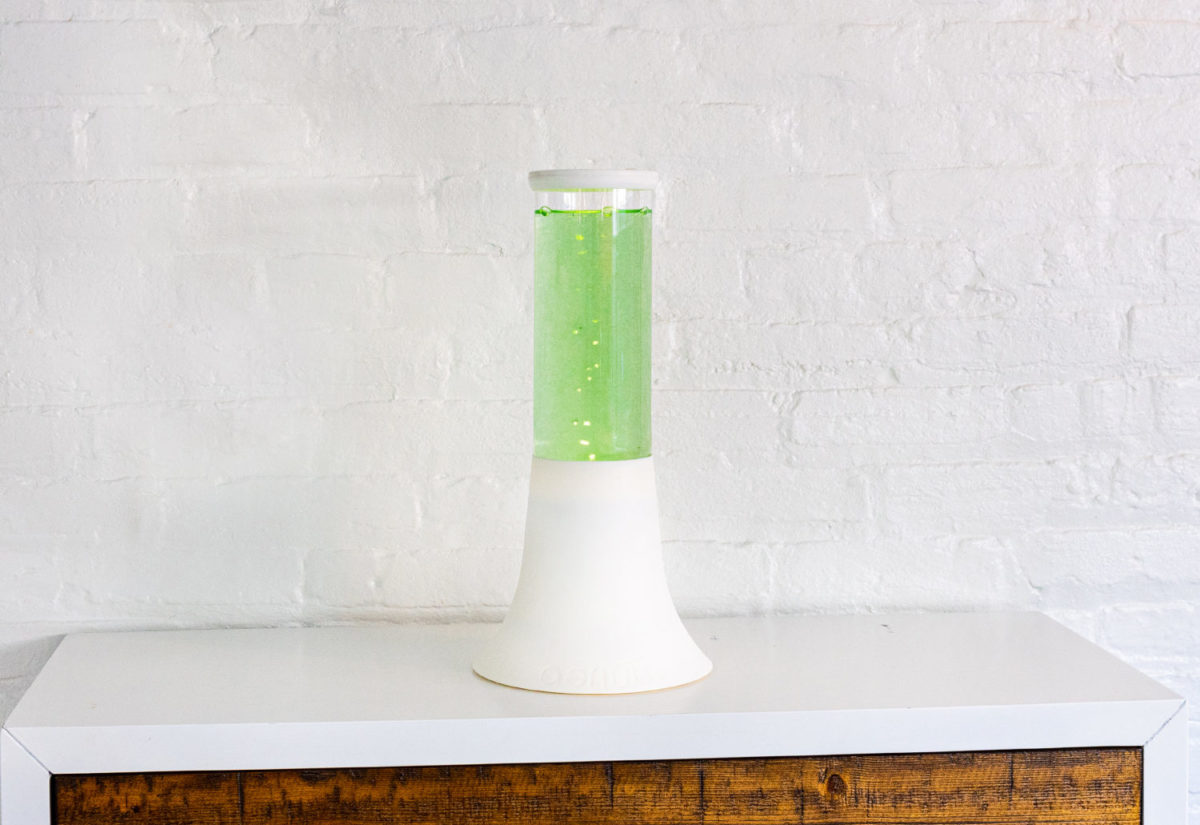In a good sign for the local startup scene, Pittsburgh’s expertise in hardware and manufacturing pulled a young and growing environmental tech company’s founders to set down new roots.
The previously Baltimore-based AlgenAir moved its headquarters to Pittsburgh. Founded in 2018, the company specializes in the development of natural air purifiers, using a high concentration of algae to reduce carbon dioxide levels.
What started as an idea to create algae urban farms for nutraceuticals pivoted to an air purification product after cofounders Kelsey Abernathy and Daniel Fucich — who met while pursuing their Ph.D. degrees in environmental molecular biology at the University of Maryland — realized that many office buildings struggled with air quality.
“You can remove particulate matter like dust motes and bacteria with a HEPA filter, but you can’t remove gaseous pollutants like carbon dioxide,” Abernathy, who is also the company’s CEO, told Technical.ly. Enter the Aerium — AlgenAir’s signature product that aims to resolve that problem. “It’s a consumer natural air purifier that uses algae to reduce carbon dioxide and increase oxygen. It’s the same as having 25 plants in a room,” she said.
Though the company was launched as an LLC in 2018, Abernathy and Fucich, who is the startup’s chief science officer, switched it over to a C corporation last year, as their academic work came to a close and they were able to commit to AlgenAir full time. With that shift, both cofounders decided to move to Pittsburgh for the next phase of growth and commercialization. The move will also enable AlgenAir to build on existing Pittsburgh ties, like one it has with Innovation Works after being a winner of AlphaLab Gear’s Hardware Cup in 2019.
So why the move here when Baltimore’s resources helped launch AlgenAir in the first place? Technical.ly talked to Abernathy and Fucich about what they see in Pittsburgh, their plans for growth in the next year and more. This interview has been edited for length and clarity.
###
Technical.ly: Why did you choose to physically move to Pittsburgh at a time when companies are still questioning the need for in-person work?
Daniel Fucich: Being close to the [circuit board] supply chain was integral to it. But you’re right, you can do a lot of things remotely. For me personally, it was really cool to come back to Pittsburgh. I finished my undergrad in 2015 at Duquesne University. I always loved the city. And obviously, [we have] our involvement with AlphaLab Gear — we’re really, really lucky to be partnering with them and accelerating our hardware development process in a way that would never be able to be possible if we didn’t have their help and expertise.
Will you have a physical office space in Pittsburgh, and do you plan on hiring locally based talent?
Kelsey Abernathy: Right now, it’s just Dan and I and we’re still a startup. The company is now headquartered here and we plan to grow the company here, and when we start hiring people, they will probably be primarily Pittsburgh located. So we’d love to set some roots down here. I think for us, to add on to what Dan said, it was more than just being near the suppliers. It’s the fact that Pittsburgh has this expertise in hardware and manufacturing. And there’s lots of people in this ecosystem that we can connect with that will continue to help us build the product and build the company.
How do you still see a need for your product at a time when offices are less occupied and possibly less concerned with air quality?
KA: I think one of the interesting things that’s come out of the past few years is that people are paying more attention to their air quality, specifically their indoor air quality, than they ever have before. And with that comes an interest in things beyond just particulate filters, which is mostly what’s available on the market. It’s the realization that carbon dioxide is a huge problem. And there was an article in the New York Times last fall about how parents are sending their kids to school with CO2 monitors in their backpack because schools have some of the highest CO2 concentrations of any building.
Even if people aren’t necessarily back in the office, they’re still working from home and they’re doing that in small apartments or home office space, which is another closed area that depending on the time of year and where you live, you’re not always able to open a window at either. Even if office space and commercial real estate is not as big as it was before because of everything being more virtual, there’s always going to be buildings and this system can integrate into a lot of different types of buildings. So beyond an office itself, there’s a lot of applications.
Where can people find out more about joining your team or supporting your company?
KA: We will be posting [jobs] probably on our website and on our LinkedIn page for AlgenAir. We are in the early stages of raising a seed round of funding. So that hiring process will probably be taking place closer to the summer of this year when we’ve completed that fundraising.







